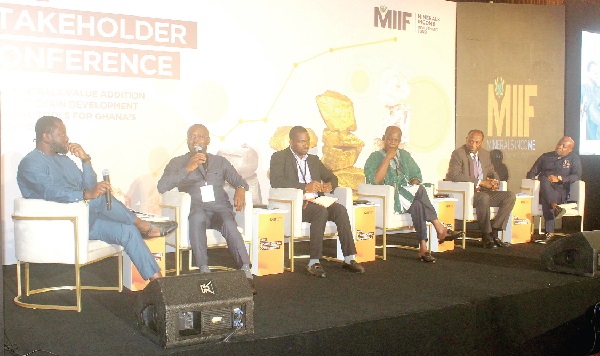
Minerals Income and Investment Fund injects $950m into economy
The Minerals Income and Investment Fund (MIIF) has injected $950 million into the Ghanaian economy within 11 months.
The fund also supported the Gold for Oil programme by providing up to $626 million to Bulk Oil Distribution Companies (BDCs) between September 2023 and August 2024.
The investment was made possible through the MIIF Gold Trade Desk.
"I dare say that we are one of the reasons why we have seen a relative stability of the local currency in recent times," the Chief Executive Officer of MIIF, Edward Nana Yaw Koranteng, said at the opening of a stakeholder conference in Accra last Tuesday.
Other investments
He said the fund had invested $40 million in Asante Gold Corporation, a gold exploration and production company, and now the Ghana Stock Exchange (GSE).
This, he said, makes it the only major large-scale mine with significant Ghanaian interest since the post divest divestiture implementation programme in the 1980s.
He said the MIIF has also completed a GH¢25 million investment into Injaro Venture Capital to support the micro sub-sector of the mining industry in line with the Government of Ghana's (GoG) local content policy.
He said the fund was in the process of investing $32.9 million in lithium underpinned by the government's critical minerals policy.
In line with this, he said the fund has invested $5 million in the holding company of Atlantic Lithium while investing $27.9 million in local assets in Barari DV for the project, which would start production in 2025 subject to ratification by Parliament.
He said this includes seven other tenements in the Central Region, all owned by Atlantic Lithium. “I think it will be important to note that our (Ghana or MIIF) investment is the third largest in Atlantic Lithium shareholding worldwide.
This means that in case Atlantic Lithium discovers lithium in Brazil, Cote d'Ivoire, Nigeria and Congo, MIIF has a major state in this investment,” he said.
Incubation programme
Going forward, the CEO stated that MIIF was in the process of introducing the pilot phase of what has been described as the most revolutionary financing initiative for junior gold mines in Africa.
He said the initiative, termed the mining incubation programme, sought to assist licensed junior and small-scale mines in Ghana to support mercury-free environmentally sustainable gold mining practices.
“On the back of this, I would like to push and ensure that these miners develop to become junior miners that can be listed in the Ghana Stock Exchange,” he said.
He said on the back of a detailed resource estimate, it would cover the provision of working capital and funds for mining machinery, ensure corporate governance structures, institute a traceability and tracking mechanism for all small-scale miners underpinned by environmental social governance (ESG) and ensure that their gold production gets a full market through the MIIF Gold Trade Desk.
Comparative advantage
The Deputy Minister of Lands and Natural Resources, Mireku Dukers stated that minerals endowment creates comparative advantage opportunities and could be the basis or the folder for inspiring development.
However, he said as important as the advantages of natural endowment were, it has its own limitations, if not properly partnered with appropriate value addition within the context of an optimised value chain development.
“The absence of or limited access to technology in most of the minerals and rich countries means that the minerals are only exploited and exported to jurisdictions that are more technologically endowed and, therefore, have a comparative advantage in that respect.
Indeed, sometimes, some of these countries with the technology to add value have virtually no mineral endowment at all,” the deputy minister said.
He explained that these receiving countries then convert the minerals into products that meet the demands of modern-day living and are marketed across the world, including those countries which exported their minerals in their raw state.
He said this creates inequities, which then disadvantage the predominantly mineral-rich countries like Ghana and add an advantage to those providing the value addition services.
He, therefore, called on all stakeholders to support the efforts of the government to add value to mineral resources before they get to the market.
The conference
The conference, organised by MIIF, was under the theme: "Minerals value addition and value chain development- essential tools for Ghana's development".
This conference created a platform to explore the pivotal role of minerals value addition and value chain development in driving Ghana's sustainable economic growth.
With the conference, MIIF sought to foster deeper conversations and practical evidence-based actions that can be used to help Ghana transition from raw mineral exports to processing and manufacturing.
The goal is to chart an inclusionary path towards maximising Ghana's mineral wealth for long-term development and improved livelihoods.